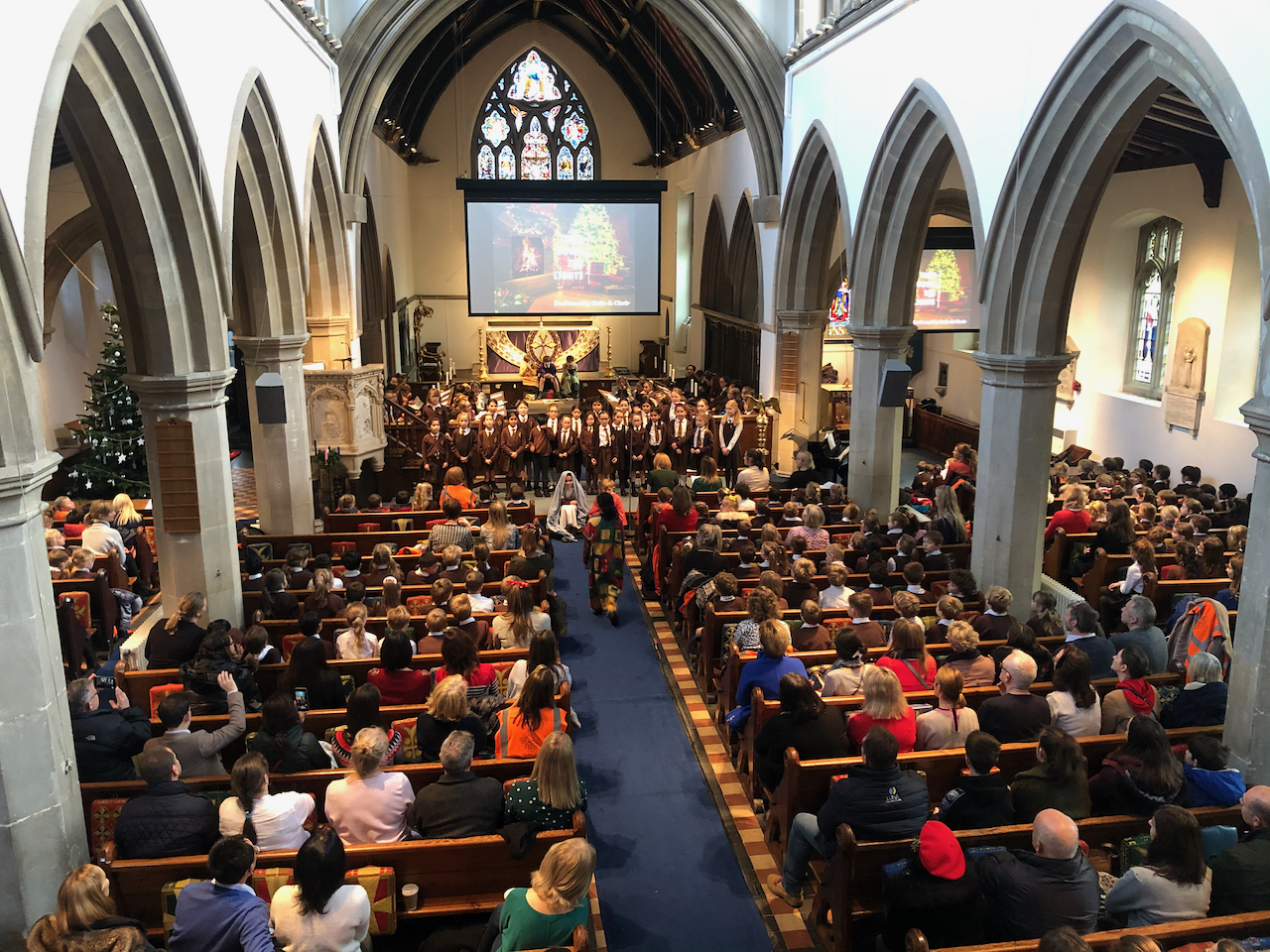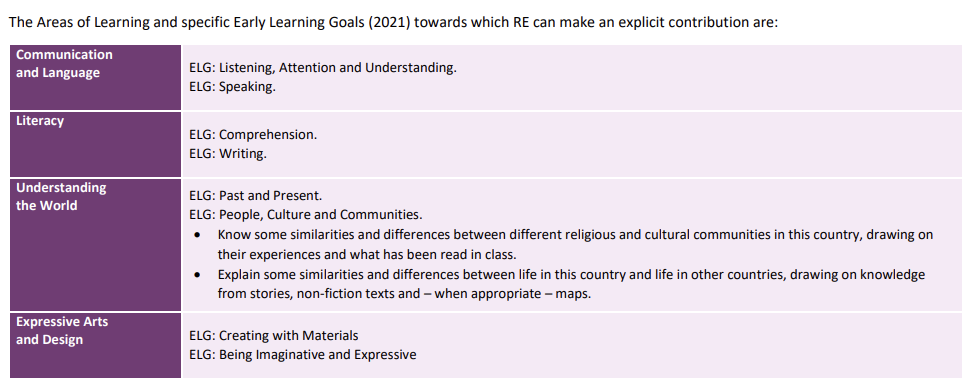RE

Curriculum Intent
“RE plays a central role in a broad and balanced curriculum that will enable students to participate fully in a multi-religious and multi-secular world. It aims to enable young people to hold informed and balanced conversations about world views, religion and beliefs. It provides a safe environment where pupils can explore their own ideas and learn to evaluate the opinions of others. Whilst a greater emphasis is placed upon the Christian faith in RE in church schools, it is important that young people experience the diversity of lived religion.” (The Oxford Diocese Board of Education website)
“How we behave and live our lives affects other people and the world we live in. This is why our behaviour and ways of living are important issues. Our behaviour is influenced by our attitudes. Our attitudes are influenced by our experiences and beliefs. RE is the opportunity to reflect on our experience of the world and the beliefs, values and attitudes that guide us through life. We do this by exploring the beliefs, values, practises, and ways of living from the principal religions and different world views. We all play a part in creating the world and society we live in. What we believe, whether religious or not, contributes significantly to this. RE helps pupils (and the school as a whole) to reflect on the ways in which beliefs influence how people live their lives.” (Buckinghamshire Agreed Syllabus 2022)
Here at St Mary and All Saints’ CE School, we aim for children to leave being able to:
- Understand the nature, role and influence of religion in the world
- Pursue a personal quest for meaning, purpose and value
- Formulate reasoned opinion/argument and handle controversial issues and truth claims
- Develop understanding of and respect for different worldwide views
Curriculum Implementation
Skills
The pupils are taught to use a variety of skills to investigate RE questions and widen their knowledge of various world views. The learning process skills include identifying, exploring, contextualising, reflecting, investigating, synthesising, responding and evaluating (as explained below.)
As the Buckinghamshire Agreed RE syllabus 2022 states, the pupils will learn these skills in each key stage:
Key Stage 1
Pupil Experience
- Identify - Pupils recognise what is significant to them in their immediate experience and recognise some basic concepts used to express this
- Explore - Pupils learn how to find out about other people’s experience and feelings in a way that is sensitive and appropriate and to relate their own experience and that of others to the general concepts being developed
- Contextualise - Pupils learn to see their own experience in the light of their own background and compare this sensitively with the experience of other pupils in the class
- Reflect - Pupils learn to think about their experience and the feelings related and to see how these affect themselves and others
Religious/world view context
- Investigate - Pupils learn about related experiences and concepts within the religions explored
- Contextualise - Pupils learn to see the religious experience in the context of the beliefs and practises of the religion being explored and the feelings that arise from them for believers
- Reflect - Pupils learn to think about the religious experience and concepts and their significance to the believers and to see how these make a difference to how they live
- Respond - Pupils learn how to express sensitively and in a variety of ways their own views about the religious experiences and concepts
- Synthesise - Pupils learn to identify similarities and differences between their own experience and the religious beliefs practises and concepts they have explored
Universal Human Experience
- Reflect - Pupils learn to think about what they can take from their learning about the religions to help them understand their own experience feelings and beliefs
- Apply - Pupils relate the religious experience, beliefs and concepts they have explored to their own lives and think about how their own ideas have developed
Lower Key Stage 2
Pupil Experience
- Identify - Pupils learn to identify what is most important to them in terms of people places celebrations and beliefs
- Explore - Pupils learn to ask thoughtful and searching questions about their own views about what is important to them and why
- Contextualise - Pupils compare and contrast their own views with those of others in the class
- Reflect - Pupils think about how these different ‘values’ affect their own and other peoples’ lives
Religious/world view context
- Investigate - Pupils learn how to enquire into what do religions and traditions hold to be most important and how these are expressed personally and in the community
- Contextualise - Pupils relate religious beliefs to the practises, lifestyles and attitudes of the religions explored learning to identify differences and similarities between religions
- Reflect - Pupils learn to consider what is important to religious people through their exploration of religious beliefs concepts and practises and how these compare with their own
- Respond - Pupils explain their responses to the beliefs and practises giving reasons for their views
- Synthesise - Pupils think about what the beliefs and practises show about what is important to human beings
Universal Human Experience
- Reflect - Pupils reflect on what they have learnt about what people and communities see as of great importance in life
- Apply - Pupils consider how their views on what is important in life may have developed through their study of these religions and world views
Upper Key Stage 2
Pupil Experience
- Identify - Pupils identify their own responses to some of the big questions that life can throw at us
- Explore - Pupils ask thoughtful and searching questions about their own responses to some of the ultimate questions raised through the material studied
- Contextualise - Pupils compare and contrast their own response with those of others in the class
- Reflect - Pupils consider why these are different responses to ultimate questions
Religious/world view context
- Investigate - Pupils learn how to enquire into the religious and non-religious beliefs, practises and concepts and to explore what they reveal about different responses to ultimate questions
- Contextualise - Pupils relate religious beliefs and concepts to the practises, lifestyles and attitudes of the religions and beliefs explored and the differences and similarities between religions
- Reflect - Pupils consider how the religious and non-religious beliefs concepts and lifestyles relate to responses to ultimate questions
- Respond - Pupils consider the extent to which the religious beliefs and concepts express a reasonable response to the ultimate questions
- Synthesise - Pupils relate to the religious beliefs concepts and practises that they have explored to their own experience and views, and consider their own beliefs, values and way of living in the light of these
Universal Human Experience
- Reflect - Pupils reflect on what they have learnt and what these might suggest about common human values, responsibilities and experience
- Apply - Pupils consider how their understanding of the world may have developed through their exploration of the religions and world views.
(Buckinghamshire Agreed RE syllabus, 2022)
Knowledge
The Religious Education curriculum is based on two key aspects of learning:
- Learning about religion - all pupils will learn about Christianity and other world faiths in a course in which Christianity will clearly predominate. Children in Key Stage 1 should learn about Christianity and one other religion Children in Key Stage 2 should learn about Christianity and two other religions.
- Learning from religion - the syllabus also requires us to build bridges between the pupils’ own lives and the religious content that they explore. Whether the pupil comes from a particular faith background or none, religious education should be relevant to their lives and engage them in meaningful learning that they can apply to life. Teachers will use these strands when planning their lessons.
At St Mary and All Saints CE Primary school, RE is taught using the ODBE (Oxford Diocese Board of Education) scheme of work to support us in following the Buckinghamshire Agreed RE syllabus. Each unit begins with a “Big Question” which allows the children to challenge their understanding. They are able to not only learn about different religions but also learn from them through enquiry and analysis. Christianity, in line with national guidelines, is the predominant religion taught, however the children also get to experience other religions such as Judaism, Hinduism, Islam throughout their time at school. Whenever the children are given the opportunity to reflect on what they have learnt, they are encouraged to consider what difference their learning is making to their thinking and acting. The children also get the opportunity to visit different places of worship and / or learn from a variety of religious visitors. For details of the specific religions and unit questions taught in each year group then please see the RE school overview at the end of this document.
Vocabulary
The relevant religious vocabulary is taught and practised in each lesson. This vocabulary is then revised and revisited in further RE lessons. Sentence starters are often given to the children to help them articulate their answers and opinions.
Early Years Foundation Stage
RE is a statutory requirement in Reception classes and above. It is often taught through play opportunities, story time and sometimes separate lessons. RE is taught through the Early Years foundation stage curriculum and mainly through ‘Knowledge and Understanding of the World.’ In Reception, the children learn about various religious festivals and hear a variety of religious stories. They are given the opportunity to explore religious artefacts and learn RE through both play and adult focused activities. The reception classes usually have visitors from a variety of religious backgrounds which helps them apply context to their learning. They are given the opportunity to enjoy learning about a variety of religious festivals or practises through art, dance and music activities. Personal, social and emotional development opportunities help them to understand their self-identity and develop general respect for people who are different to them which contributes to their RE development.


(Buckinghamshire RE agreed syllabus 2022)
